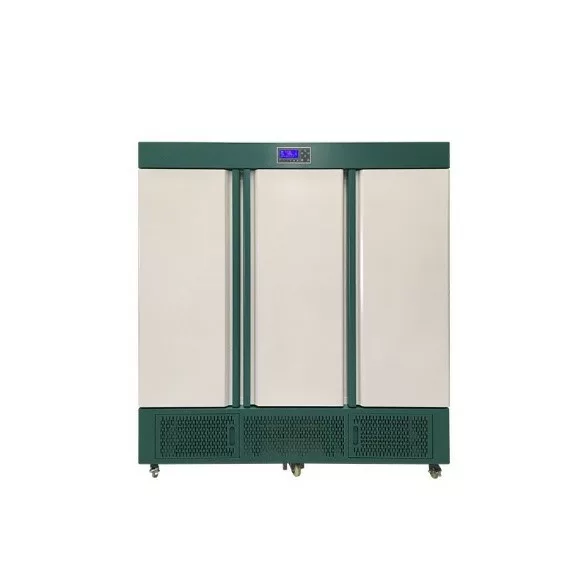Optimize Your Research with a Precision CO2 Climate Incubator KCI/C/1500
In the world of scientific research, precision and consistency are paramount. CO2 Climate Incubator KCI/C/1500 is a crucial tool for laboratories that need to maintain exact environmental conditions for the growth and development of sensitive samples. Whether you’re working in biology, pharmaceuticals, environmental science, or agriculture, a climate incubator ensures that your experiments, cultures, and products are kept in optimal conditions. This guide explores the features, benefits, and applications of climate incubators, helping you make an informed decision for your lab’s needs.
What is a Climate Incubator?
A climate incubator, also known as an environmental chamber or controlled environment incubator, is a specialized laboratory device designed to create and maintain stable environmental conditions. Unlike standard incubators that typically only control temperature, climate incubators offer control over multiple factors, including temperature, humidity, light, and, in some cases, CO2 levels. This versatility makes them ideal for a wide range of applications, from the cultivation of cells, tissues, and microorganisms to the stability testing of products under specific environmental conditions.
Key Features of CO2 Climate Incubator KCI/C/1500
- Precise Temperature Control: One of the most critical features of a climate incubator is its ability to maintain a consistent temperature. Advanced models can regulate temperatures with an accuracy of ±0.1°C, ensuring that your samples are kept under stable conditions, essential for reproducibility in scientific experiments.
- Humidity Control: Many climate incubators come with integrated humidity control systems, allowing you to set and maintain specific humidity levels. This is particularly important for experiments involving plants, fungi, or materials that are sensitive to moisture.
- CO2 Control: For certain biological applications, such as cell culture, maintaining the correct CO2 concentration is crucial. Some climate incubators offer CO2 control, providing an optimal environment for cell growth and other biological processes.
- Light Control: For research involving photoperiod-sensitive organisms, climate incubators can simulate day and night cycles with adjustable light settings. This feature is particularly useful in plant research, where light exposure is a key variable.
- Uniform Air Circulation: To ensure that temperature, humidity, and other factors are evenly distributed throughout the chamber, climate incubators are equipped with fans or air circulation systems. This uniformity prevents hot or cold spots and ensures all samples experience the same conditions.
- Programmable Settings: Modern climate incubators offer programmable controls, allowing researchers to set and adjust environmental conditions according to the specific needs of their experiments. This feature is especially useful for long-term studies or for experiments that require gradual changes in environmental conditions.
- Data Logging and Remote Monitoring: Many advanced climate incubators come with data logging capabilities, allowing researchers to monitor environmental conditions over time. Some models also offer remote monitoring, enabling you to check on your experiments from anywhere via a connected device.
Benefits of Using a Climate Incubator
- Enhanced Experimental Accuracy: By maintaining precise environmental conditions, climate incubators help ensure the accuracy and reliability of your experimental results. This level of control is essential for high-stakes research where even minor fluctuations can impact outcomes.
- Versatility in Applications: Climate incubators are incredibly versatile, making them suitable for a wide range of research and industrial applications. Whether you’re cultivating cells, testing pharmaceuticals, or conducting environmental research, a climate incubator can provide the specific conditions your work requires.
- Improved Reproducibility: Reproducibility is a cornerstone of scientific research. Climate incubators allow you to replicate the same environmental conditions across multiple experiments, ensuring that your results can be consistently reproduced.
- Increased Efficiency: With programmable settings and remote monitoring capabilities, climate incubators allow for more efficient management of experiments. You can set your incubator to automatically adjust conditions, freeing up time for other research tasks.
- Long-Term Experimentation: Climate incubators are ideal for long-term studies, as they can maintain stable conditions over extended periods. This is particularly important for research that requires continuous monitoring and precise environmental control.
Applications of Climate Incubators
- Biological Research: In biology, climate incubators are used to grow and maintain cultures of cells, tissues, and microorganisms under controlled conditions. This is essential for studies in areas such as microbiology, genetics, and cell biology.
- Pharmaceutical Development: In the pharmaceutical industry, climate incubators are used for stability testing of drugs and other products. By exposing products to specific environmental conditions, researchers can determine their shelf life and stability.
- Plant Science: Climate incubators are used in plant science to simulate various environmental conditions, such as light cycles, temperature changes, and humidity levels. This allows researchers to study plant growth, development, and responses to environmental stressors.
- Environmental Research: Climate incubators are used to study the effects of different environmental conditions on organisms and materials. This includes research on climate change, pollution, and ecosystem responses.
- Quality Control in Manufacturing: In industries such as food and cosmetics, climate incubators are used to test the stability and quality of products under different environmental conditions. This ensures that products remain safe and effective throughout their shelf life.
Choosing the Right Climate Incubator
When selecting a climate incubator, it’s important to consider the specific requirements of your research or application. Key factors to evaluate include the range and precision of temperature and humidity control, the size of the chamber, the availability of CO2 and light control, and the ease of programming and monitoring. Additionally, consider the incubator’s build quality, reliability, and support services offered by the manufacturer.
Conclusion
A climate incubator is an invaluable tool for any laboratory or research facility that requires precise environmental control. By providing a stable and customizable environment, these incubators support a wide range of scientific and industrial applications, from biological research to product testing. Investing in a high-quality climate incubator can enhance the accuracy, efficiency, and reproducibility of your work, helping you achieve better results and advance your research or production processes.
For expert advice on choosing the best climate incubator for your needs, contact our team today.





Reviews
There are no reviews yet.